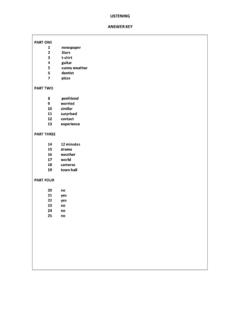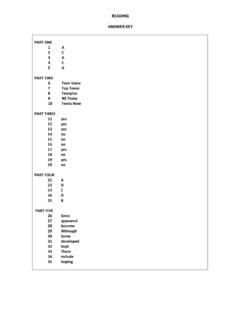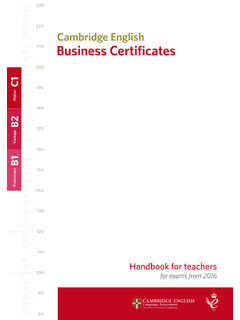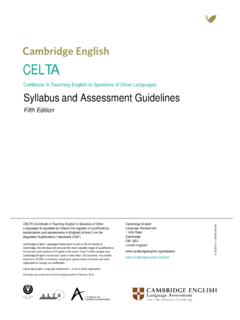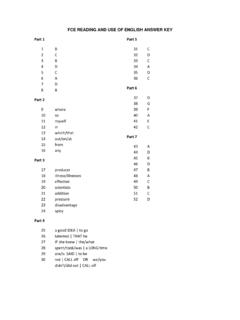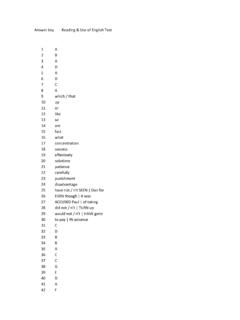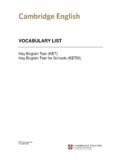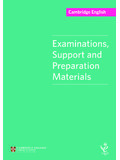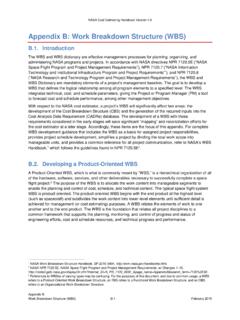Transcription of Cambridge English: Proficiency Speaking Sample test with ...
1 UCLES 2013. This material may be photocopied (without alteration) and distributed for classroom use provided no charge is made. For further information see our Terms and Conditions at Cambridge English: Proficiency Sample Speaking test with examiner s comments Page 1 of 9 Cambridge English: Proficiency Speaking Sample test with examiner s comments This document is written to help you familiarise yourself with the Cambridge English: Proficiency Speaking test, also known as Certificate of Proficiency in English (CPE). It accompanies this video, where you can see Rodrigo, from Argentina, and Ollin, from Switzerland, take a Speaking test.
2 Both these candidates cope well overall with the tasks in the test. Contents: About the Cambridge English: Proficiency Speaking test How the Cambridge English: Proficiency Speaking test is assessed Comments on the Sample test: Part 1 Part 2 Part 3 Overall UCLES 2013. This material may be photocopied (without alteration) and distributed for classroom use provided no charge is made. For further information see our Terms and Conditions at Cambridge English: Proficiency Sample Speaking test with examiner s comments Page 2 of 9 About the Cambridge English: Proficiency Speaking test The Speaking test is 16 minutes long and consists of three parts.
3 The standard test format is two candidates and two examiners. One examiner (the interlocutor) conducts the test, providing you with the necessary materials and explaining what you have to do. The other examiner (the assessor) will be introduced to you, but then takes no further part in the interaction. Part 1 (2 minutes) The interlocutor first asks you and your partner a few questions which focus on information about yourselves. Part 2 (4 minutes) In this part of the test you and your partner are asked to talk together. The interlocutor places a set of pictures on the table in front of you.
4 There may be only one picture in the set or as many as seven pictures. This stimulus provides the basis for a discussion. The interlocutor first asks an introductory question which focuses on two of the pictures (or in the case of a single picture, on aspects of the picture). After about 1 minute, the interlocutor gives you both a decision-making task based on the same set of pictures. Part 3 (10 minutes) You are each given the opportunity to talk for 2 minutes, to comment after your partner has spoken and to take part in a more general discussion. The interlocutor gives you a card with a question written on it and asks you to talk about it for 2 minutes.
5 After you have spoken, the interlocutor asks you both another question related to the topic on the card, addressing your partner first. This procedure is repeated, so that your partner receives a card and speaks for 2 minutes and a follow-up question is asked. Finally, the interlocutor asks some further questions, which leads to a discussion on a general theme related to the subjects already covered in Part 3. UCLES 2013. This material may be photocopied (without alteration) and distributed for classroom use provided no charge is made. For further information see our Terms and Conditions at Cambridge English: Proficiency Sample Speaking test with examiner s comments Page 3 of 9 How the Cambridge English: Proficiency Speaking test is assessed What the examiners are interested in As you do the test, the assessor focuses on these areas of your English: Grammar Are you using a wide range of grammatical structures?
6 Are you using these structures correctly? Are you showing that you can be flexible in your use of grammar? Vocabulary Are you using a wide range of vocabulary? Is the vocabulary appropriate for the subject you re talking about? Are you using this vocabulary correctly? Are you showing that you can use suitable vocabulary to discuss topics that are abstract and unfamiliar to you, as well as topics you are used to talking about? Discourse Management Are you showing that you can give both long and shorter answers? Are you able to speak fluently? Is what you re saying relevant to the subject of the discussion?
7 Are you able to discuss a subject in detail and at a more general level too? Is what you re saying clear and well organised? Are you using a wide range of words and phrases to connect your ideas and organise what you are saying? Pronunciation You don t need to have a perfect English accent, but you need to be clear at all times. Are you pronouncing individual words clearly? Is your voice going up and down at the right times? Are you stressing the right parts of words, and the right words in sentences? Does your pronunciation help you to communicate what you mean in a clear and effective way?
8 Interactive Communication Are you able to interact with the other candidate easily and effectively? Are you listening to the other candidate and answering in a way that makes sense? Are you able to start and develop a discussion? Are you able to manage the discussion so that you and the other candidate come to an agreement about a decision? The interlocutor focuses on your Global Achievement. This is about your general performance. How well are you Speaking about the topics you re given? Are your answers clear and fluent? Are you using language that is right for the Cambridge English: Proficiency level?
9 When your test is complete, the examiners give you marks for each of these things Grammar, Vocabulary, Discourse Management, Pronunciation, Interactive Communication and Global Achievement. The marks are for what you do over the whole Speaking test, not for each part of the test. The examiners give you marks for your own performance they don t compare you with the other candidate. UCLES 2013. This material may be photocopied (without alteration) and distributed for classroom use provided no charge is made. For further information see our Terms and Conditions at Cambridge English: Proficiency Sample Speaking test with examiner s comments Page 4 of 9 Comments on the Sample test Part 1 Rodrigo Ollin Rodrigo gives clear and appropriate short answers to the first two questions.
10 For the third question How good are you at organising your time? Rodrigo also gives a clear and relevant answer. The first thing he says that s a good question gives him a few seconds to think about what he is going to say. It s fine to use fillers like these, as we do it in everyday conversation. Rodrigo then shows a good range of vocabulary: I keep putting things off to the end and procrastinating and that kind of stuff. I try to set deadlines but .. Rodrigo could perhaps have said a little more in answer to the third question. An example of when he has put something off , for instance, would have shown his ability to talk about something in detail.
